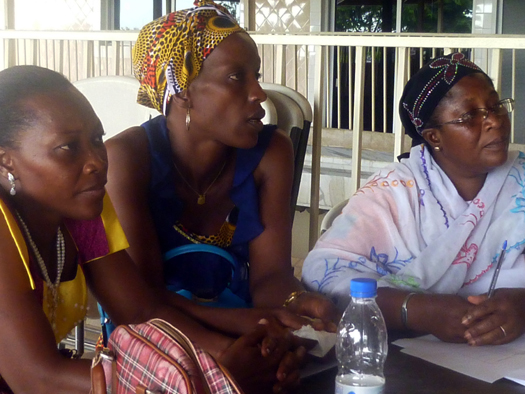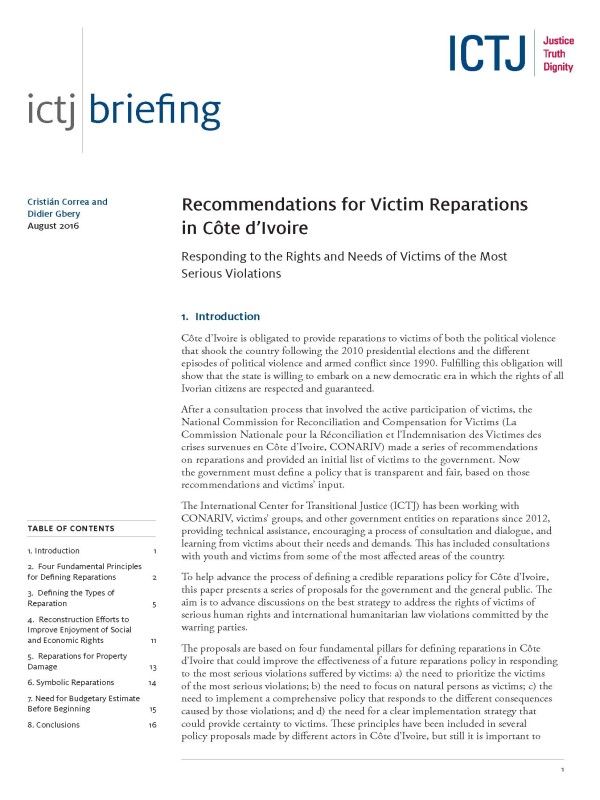After a consultation process that involved the active participation of victims, the National Commission for Reconciliation and Compensation for Victims (La Commission Nationale pour la Réconciliation et l’Indemnisation des Victimes des crises survenues en Côte d’Ivoire, CONARIV) made a series of recommendations on reparations and provided an initial list of victims to the government. Now the government must define a policy that is transparent and fair, based on those recommendations and victims’ input.
ICTJ has been working with CONARIV, victims’ groups, and other government entities on reparations since 2012, providing technical assistance, encouraging a process of consultation and dialogue, and learning from victims about their needs and demands. This has included consultations with youth and victims from some of the most affected areas of the country. To help advance the process of defining a credible reparations policy for Côte d’Ivoire, this paper presents a series of proposals for the government and the general public. The aim is to advance discussions on the best strategy to address the rights of victims of serious human rights and international humanitarian law violations committed by the warring parties.
Th rough these recommendations, ICTJ seeks to present the knowledge and experience it has gained over several years working in Côte d’Ivoire with government entities, civil society organizations, and victims’ groups that shared valuable insights on understanding the needs, priorities, and possible avenues for providing reparations. It is hoped that these proposals will help to define a reparations policy for Côte d’Ivoire that effectively addresses the consequences of violence that continue to impede the lives of victims.
"The government must consider the fact that some victims are more in need than others and that these victims should be prioritized."

Four important issues should define a reparations policy that aims to address the consequences of the most serious crimes on victims’ lives:
- Prioritizing Violations of the Severest Nature
- Limiting Reparations to Natural Persons
- Reparations Should Include More Than Payment of Compensation
- Making Sure Promises Are Fulfilled
Types of Reparations Measures
Based on consultations carried out in different regions of the country, the following types of reparation measures were identified as needed:
1. Some form of individual reparation, including compensation for victims of the most serious violations and the most vulnerable victims, but also other forms of rehabilitation and satisfaction
2. A set of community measures (including psychosocial support) in neighborhoods or towns with a high concentration of victims
3. The search for the missing and the forcibly disappeared, including those who were killed and buried in mass graves. Th is comprises honoring their remains and responding to the needs of the families
4. A reconstruction policy to ensure certain minimum standards of access to social and economic rights, including the right to education and health care. This policy should give priority to the most affected areas or areas that have low development due to the armed conflict and political crisis
5. Symbolic reparations and public apology
The following examples are based on reparations that victims have proposed to ICTJ and experiences in other countries:
Conclusions
"The reparations program must respond to the most serious consequences of the violence for victims through measures that address their long-lasting socioeconomic, psychosocial, and education-related effects for victims and their children, and health and other consequences that limit victims’ ability to exercise their rights."
The government of Côte d’Ivoire should define a reparations policy through a transparent and participatory process. This will require making public the reports of CONARIV, CDVR, the Commission Nationale d’Enquête (CNE), and others that could help stakeholders in assessing the number of victims and their needs. Following CONARIV’s approach, the government should consult victims and other civil society organizations throughout the process of designing and implementing a comprehensive reparations policy.
However, in defining its priorities, the government must consider the fact that some victims are more in need than others and that these victims should be prioritized.
Ultimately, the reparations program must respond to the most serious consequences of the violence for victims through measures that address their long-lasting socioeconomic, psychosocial, and education-related effects for victims and their children, and health and other consequences that limit victims’ ability to exercise their rights. It should also include a reconstruction effort that can guarantee the enjoyment of basic rights in the areas of the country affected by violence, destruction, and marginalization.
Moreover, reparations should affirm the dignity of victims, ensuring that the services provided are defined and implemented in an interactive and respectful way for victims.
Implementation may require defining a clear policy first, and then a timeline for the different actions to follow. A decision must be made regarding the victims’ registry as well as considerations of how to include those who were not able to apply because they resided abroad or suffered other obstacles. If such a registration process is carried out, it should be done using the same criteria and experience as CONARIV (and likely the same staff ), in order to guarantee consistency.
Recognition of state responsibility with regard to these serious harms is another key factor for making reparations effective. Violence and destruction were not the result of natural causes, but of political decisions made by those in power. Th e most senior-ranking state officials should clearly apologize to victims, and victims should not be forced to provide forgiveness in return. Forgiveness is something that can be asked for, but never demanded.
If two other policies are not implemented contiguously, however, all of these efforts will fall short. The first are policies that work to guarantee the nonrepetition of acts of political violence and repression, which requires looking at the conduct of the armed forces, the police, the Gendarmerie, as well as armed groups that fought during the armed struggle.
The second is the enforcement of respect for human rights and humanitarian law in all state institutions. Individuals found responsible for violating these norms should be prevented from promotion and removed from the services. Mechanisms for safeguarding how the police and the military recognize and respect citizens’ rights is essential, and reforms establishing adequate oversight are needed.
Another crucial component of making the reparations policy a credible effort is investigating and prosecuting serious violations of human rights and humanitarian law. Those violations cannot go unpunished. Efforts to establish a strong democracy based on respect for human rights requires a combination of factors. Victims, and all of Ivoirian society, have the right to truth, justice, reparations, and guarantees of nonrepetition that the government, the National Assembly, and the judiciary are responsible for delivering.
"The government of Côte d’Ivoire should define a reparations policy through a transparent and participatory process. This will require making public the reports of CONARIV, CDVR, the Commission Nationale d’Enquête (CNE), and others that could help stakeholders in assessing the number of victims and their needs. Following CONARIV’s approach, the government should consult victims and other civil society organizations throughout the process of designing and implementing a comprehensive reparations policy."
